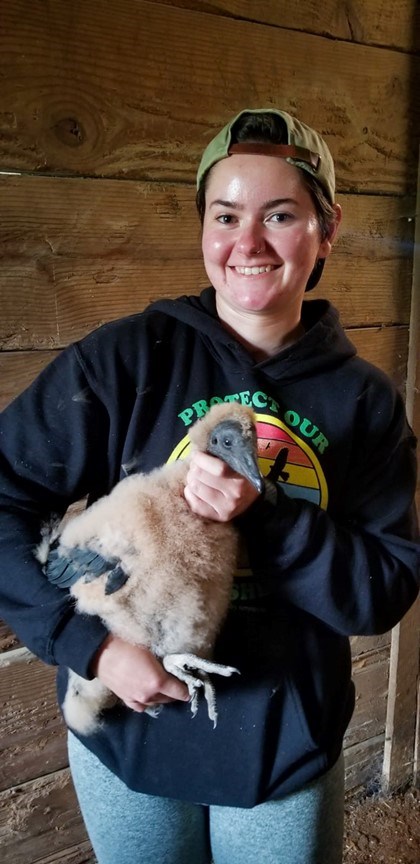Won Over by Black Vultures
Posted on in In the Field by Caroline Fegley

Before becoming infatuated by the bird-world, I experienced “bird blindness.” I would see birds daily but wouldn’t really look at or notice them. Even after being introduced to birdwatching, my eyes and ears were drawn to colorful passerines with beautiful songs who gave me an exciting game of hide-and-seek. I did not spend extra time looking at the songless vultures who boringly circled in the sky as I drove past towards something more exciting. From speaking to many others, especially friends and family with no particular interest in birds, I feel that “vulture blindness” is unfortunately common.
After beginning the conservation science traineeship this past spring, I heard a few people talking about vultures and sounding especially enthusiastic about them. Still ignorant to the species, I thought my passion would continue a course with a focus on hawks and eagles, so I was ultimately shocked when I fell in love with a pair of black vulture nestlings. Local to the Sanctuary, a pair of black vultures nested in a barn, and because of the convenient access to the chicks, Hawk Mountain’s vulture team decided to study their morphological development and behavior. I nearly turned down my first invitation to join on vulture-duty to bake some zucchini bread, but luckily I was convinced to tag along.
Twice a week, I joined Bracken Brown on the short expedition to the barn nest. In the beginning, I had virtually no experience handling birds and was grateful that the chicks were too small to put up a fight. We tried to keep our visits short to limit disturbance and collected data to see how fast the chicks were growing. In addition, Bracken placed a trail camera by the nest, which was on the ground in an empty stall, to record videos for behavioral data. Over the next seventy days, the chicks grew larger and smarter. They began using escape tactics and hiding under a pile of lumber to make it extra difficult to catch them. While they adapted to our visits, I had to grow in my handling skills to ensure comfort of the birds and accuracy in my measurements while not getting bit or vomited on.
Every time I explain to someone that the vultures threw up on me and attempted to bite me in defense, they look at me like I must be crazy to enjoy such a smelly job. However, every time we brought guests to our nest visits, they had a huge smile on their face throughout the entire experience. Once you meet a vulture, you quickly realize how large their personalities are and how easy it is to be completely obsessed with them. Not only do they serve a huge ecological importance in cleaning up the environment, but they offer unforgettable field-work opportunities. Personally, I will always remember my time with the two black vulture chicks (lovingly nicknamed Grumpy and Bashful) fondly. Not only did they give me a chance to develop raptor-handling skills, but I got a chance to witness their entertaining personalities first-hand. The “vulture blindness” is officially gone, and I hope everyone can be as excited as me to see a kettle of vultures flying as they drive by.
Download the informational pamphlets below to learn all about the black vulture and the dynamic relationship between this species and humans.
Want to support local black vulture research?